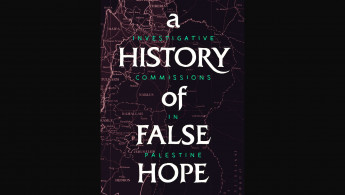A History of False Hope: Palestine's quest for recognition
Serving liberal interests has failed the Palestinian cause. Lori Allen’s book, A History of False Hope: Investigative Commissions in Palestine introduces the subject with the 2018 UN Human Rights Commission vote for an inquiry into the Great Return March protests to make a powerful statement about how the political value is swapped for a perpetual humanitarian narrative.
“Like most other recent investigative forays in Palestine, the relationship between facts, the truth about a set of events, accountability, justice, and political change was asserted, but the lines connecting them were left vague,” Allen writes.
This brief introduction into the workings of investigative commissions sets the scene for an in-depth look at the historical precedents which established international law as a powerful liberal force, rather than parameters within which political possibilities could be sought.
Throughout history, Palestinians regularly sought to engage the international community, yet the latter’s insistence upon balance played into Zionist aims
From the 1919 Paris Peace Conference, in which Palestinians articulated their opposition to Zionism, to the more recent investigative commissions ordered by the UN, such as the Goldstone report on Israel’s Operation Cast Lead war crimes in 2008 and 2009, Palestinians were relegated to a humanitarian project, despite their representatives choosing to present their political arguments from a liberal framework compatible with international law.
Throughout history, Palestinians regularly sought to engage the international community, yet the latter’s insistence upon balance played into Zionist aims. Allen’s research offers an alternative view of liberalism – one that shows “how international law accrued hegemonic force and became part of Palestinian common sense.”
With the end of the First World War and the commencement of the British Mandate, Palestinians articulated their opposition to Zionist colonialism, making it clear that their contention was against the colonialists, not the indigenous Jewish residents of Palestine. The increase in Jewish colonial settlement instigated the 1936-1939 Arab Revolt, during which the British deployed 25,000 police to aid the colonisers. The punitive measures enacted by the British mirrored the perception of the Palestinian anti-colonial struggle as one against western imperialism and empire.
As Palestinians boycotted the Peel Commission initially, Allen notes that the decision was not “a rejection of liberalism, but an insistence on them.” While the First World War established British support for Zionist paramilitary groups, the Second World War created what Allen terms “the humanitarian politics of Jewish suffering,” which was exploited by liberal politics to become “the required stance of a good liberal.” As Zionism became synonymous with Jewish suffering, and politics became influenced by the Holocaust, Palestine was viewed through the Zionist lens, even as Palestinians offered Jewish refugees citizenship in a Palestinian state.
By the end of the Second World War, humanitarianism became part of the liberal political agenda, even as Palestinians remained focused on international law. In the aftermath of the 1948 Nakba, the UN also adopted a humanitarian role. Allen notes that even the Palestinian right of return is grounded in a humanitarian perspective; hence the absence of its implementation.
While the 1960s UN Declaration of Granting Independence to Colonial Countries indicated a shift at an international level, the author illustrates how human rights at the UN constituted rhetorical embellishment, while noting that the UN’s authority at an international level reflects its absence of power. “The world’s dominant states were only willing to join the UN because it had no real power, no authority to encroach upon their sovereignty,” Allen writes.
Due to the international community’s refusal to recognise Palestinian rights, Palestinians were coerced into a narrative that dehumanised even their humanitarian predicament
Solidarity with Palestinians at the UN General Assembly increased with decolonisation, yet the UN refused Palestinians a political platform. The process of UN solidarity, the author explains, “has been powerful in suturing international law more deeply into the Palestinian political imagination, reinforcing its authority as a tool of governmentality, but has been impotent in changing the political realities.”
What the UN failed to achieve for Palestine, therefore, is also reflected in the investigative commissions which, in more recent years, took their cues from the Oslo Accords and bypassed international law. The inherent bias applied by liberalism within the international arena is juxtaposed against the Palestinian insistence on upholding international law. Due to the international community’s refusal to recognise Palestinian rights, Palestinians were coerced into a narrative that dehumanised even their humanitarian predicament.
Meanwhile, Allen states, although Palestinians utilised the liberal argument throughout history, only Israel was allowed to claim the liberal narrative. The Mitchell Commission in 2001 is one example discussed by Allen which showcases how the narrative of equivalence between Israel and the Palestinians, based upon the liberal concept adopted by the international community for Israel’s benefit, has reaped disastrous consequences for Palestinians.
The anti-colonial struggle became the measure of unacceptable violence, while Israel’s war crimes tested international law parameters in terms of impunity. Allen succinctly summarises UN mechanisms as having “encouraged many Palestinians into the echo chamber where their right to have rights is proclaimed with no power to enforce it.”
Allen’s book juxtaposes Palestinian investment in their political rights against the international community’s determination to thwart a solution. A book that takes a subaltern view of history, the book presents the illusion of “hope” in an accessible and chronological manner, pinning culpability on the international culprits that exploited Palestine for the spoils of settler-colonialism.
Ramona Wadi is an independent researcher, freelance journalist, book reviewer and blogger specialising in the struggle for memory in Chile and Palestine, colonial violence and the manipulation of international law.
Follow her on Twitter here: @walzerscent


